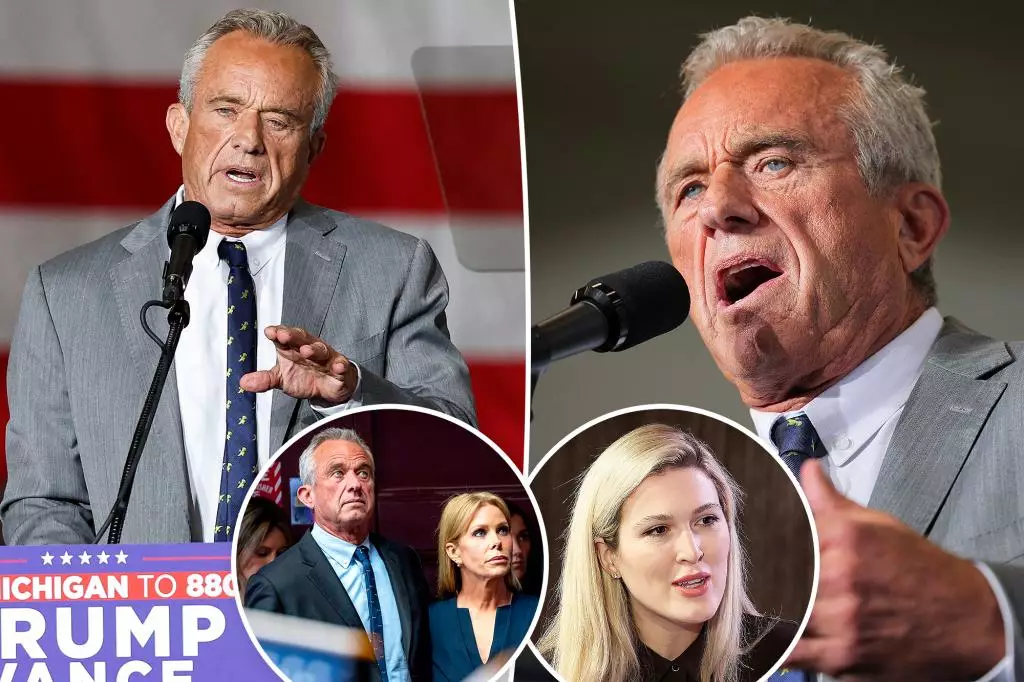In the fast-paced realm of American politics, the balance between personal integrity and public perception often teeters precariously. Recently, Robert F. Kennedy Jr. has found himself at the center of such a balancing act. His participation in a Senate roundtable on nutrition coincided with a scandal involving alleged inappropriate communications with New York Magazine writer Olivia Nuzzi. This juxtaposition highlights the complexities that public figures navigate, as they attempt to maintain their professional duties while managing personal crises.
Despite facing significant scrutiny due to the sexting allegations, Kennedy’s recent appearance at a Senate discussion on nutrition revealed a striking dichotomy: on the one hand, he presented himself as a committed advocate for public health, while on the other, he bore the weight of tabloid chatter. During the session, titled “American Health and Nutrition: A Second Opinion,” leading voices in nutrition and wellness, including Jillian Michaels and Dr. Jordan B. Peterson, shared the stage alongside him. Observers noted that Kennedy seemed unfazed, embodying an air of confidence which belied his personal challenges; one onlooker claimed he “seemed great.”
Kennedy’s ability to compartmentalize personal issues and maintain professionalism raises critical questions about the strategies public figures use to navigate crises. In his case, wearing his wedding ring amidst these allegations showcased a commitment to family, perhaps in a bid to counterbalance the scandal surrounding him. It illustrates how public personas are often constructed from carefully curated elements of personal life, all while under the public’s gaze.
Furthermore, the roundtable discussion spilled over into a much-debated topic: the influence of corporate interests on nutritional guidelines and public health policies. Kennedy’s commentary during the event challenged the underlying integrity of regulatory bodies such as the FDA and USDA, contending that these institutions have been “captured” by corporate entities they are meant to regulate. This perspective aligns with a broader narrative gaining traction in health discourse, wherein advocates argue that profit-driven motives of food and pharmaceutical companies undermine public welfare.
Kennedy’s remarks echoed a longstanding skepticism regarding the transparency of ingredient labels and the motivations behind governmental nutritional advice. His assertion that obesity—which he referred to as almost nonexistent a century ago—has been exacerbated by modern food practices, sparked intense dialogue about the intersection of nutrition, health, and economic systems in America.
As a figure deeply entrenched in the political landscape, Robert F. Kennedy Jr. embodies various contradictions that both fascinate and perplex the public. His endorsement of Donald Trump after suspending his presidential campaign illustrates a keen awareness of political strategy and public sentiment. In a speech, he posed a thought-provoking question: “Don’t you want a president that’s going to make America healthy again?” This line captures a larger theme within his political narrative—the drive to rectify perceived failures within the health system, while potentially leveraging them for future political gain.
The implications of his scandal add layers to an already complex persona. Declining to comment on the sexting affair when pressed by Fox News, he redirected the conversation towards pressing societal issues such as inflation, censorship, and the war in Ukraine—subjects ripe for his brand of moral indignation. This maneuver highlights his ability to pivot discussions away from personal foibles and back to his policy interests.
The saga surrounding Robert F. Kennedy Jr. serves as a window into the intricate dance between personal affairs and public duties that figures in the spotlight must perform. His engagement in critical health discussions, juxtaposed with his personal controversies, illustrates a broader narrative prevalent in contemporary politics. As Kennedy navigates this tumultuous terrain, the question remains: can he maintain the trust of the public while addressing the needs and challenges of a nation in search of healthier, credible leadership? Only time will tell if his balancing act will result in a solidified legacy or a cautionary tale of public figures teetering on the edge of scrutiny.

Leave a Reply